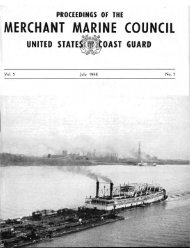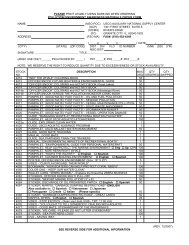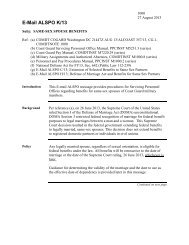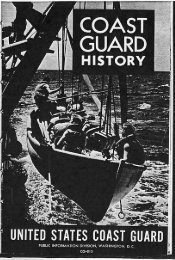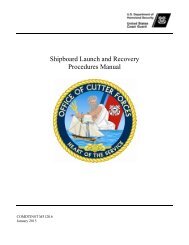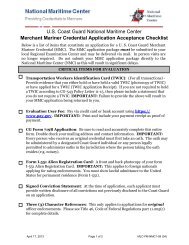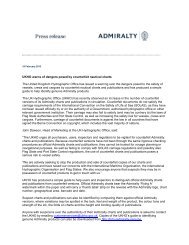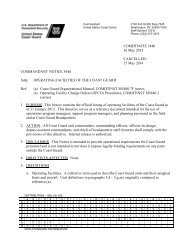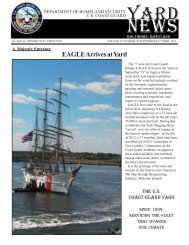Vol. 55, Issue 3-2008 - U.S. Coast Guard
Vol. 55, Issue 3-2008 - U.S. Coast Guard
Vol. 55, Issue 3-2008 - U.S. Coast Guard
You also want an ePaper? Increase the reach of your titles
YUMPU automatically turns print PDFs into web optimized ePapers that Google loves.
O N D E C K<br />
USCGR’s Vital Role: Home and Abroad<br />
As I sit and write this article,<br />
the 67th birthday — Feb. 19,<br />
<strong>2008</strong> — of the United States<br />
<strong>Coast</strong> <strong>Guard</strong> Reserve is fading fast in<br />
life’s rear view mirror. ADM Russell<br />
Waesche’s foresight in creating the<br />
<strong>Coast</strong> <strong>Guard</strong> Reserve less than a year<br />
before the attack on Pearl Harbor<br />
played a significant role in the <strong>Coast</strong><br />
<strong>Guard</strong>’s ability to rapidly expand into<br />
a 160,000-member force multiplier for<br />
the Navy. During World War II, five<br />
out of every six <strong>Coast</strong> <strong>Guard</strong>smen<br />
were reservists manning 30 destroyer<br />
escorts, 75 frigates, 750 cutters, 290<br />
Navy and 2<strong>55</strong> Army vessels. On the<br />
home front, thousands of <strong>Coast</strong><br />
<strong>Guard</strong> reservists, along side their<br />
active duty counterparts, protected<br />
vital ports and waterways and<br />
patrolled miles of coastline in search<br />
of potential saboteurs and enemy<br />
agents.<br />
Today, more than six years into the<br />
Global War of Terrorism, reservists<br />
carry on the proud legacy of the<br />
Waesche-era <strong>Coast</strong> <strong>Guard</strong> Reserve.<br />
Reservists serve in places like<br />
Bagdad, Iraq, the Kuwait Naval<br />
Base, Charleston, S.C., Bangor, Wash.<br />
and lots of places in-between. In fact,<br />
hundreds of you and your shipmates<br />
are standing the watch as you thumb<br />
through this issue of The Reservist.<br />
Thousands more of you have already<br />
answered the call or are in the<br />
process of preparing for a future<br />
mobilization. And, while our Reserve<br />
workforce is significantly smaller<br />
than our first-generation ancestors,<br />
have no doubt as to the vital role each<br />
of you plays in mission execution both<br />
here at home and overseas.<br />
Take, for example, the recent<br />
milestone reached by Sector<br />
Charleston’s Military Outload (MOL)<br />
Section. On Feb. 1 of this year, the<br />
MOL Section, which is staffed<br />
completely by reservists, completed<br />
five consecutive years of support to<br />
the Department of Defense’s (DoD)<br />
strategic sealift operations. During<br />
that time, the MOL Section flawlessly<br />
completed hundreds of security escort<br />
and security zone sorties amassing an<br />
impressive 30,760 hours underway.<br />
All this was done around the clock in<br />
all types of weather conditions and in<br />
the typically quiet and professional<br />
<strong>Coast</strong> <strong>Guard</strong> manner. When you are<br />
talking about the safe and secure<br />
movement of military munitions and<br />
hardware, quiet is exactly what you<br />
want.<br />
The missions executed by the MOL<br />
Section in Charleston are<br />
representative of similar efforts by<br />
countless other USCG personnel in<br />
dozens of U.S. ports. Since 2002, both<br />
active and reserve personnel have<br />
provided ongoing safety and security<br />
for over 100 Military Sealift<br />
Command ships as they moved over<br />
six billion square feet of military<br />
essential materiel from U.S. ports in<br />
support of DoD operations overseas.<br />
In the Pacific Northwest, the<br />
Maritime Force Protection Unit<br />
(MFPU) based in Bangor, Wash. (a<br />
second is located at King’s Bay, Ga.)<br />
provides security escorts for over $60<br />
billion worth of Navy assets. Both the<br />
Bangor and King’s Bay units were<br />
originally stood up with USCGR<br />
volunteers and continue to operate<br />
with a heavy reliance on reserve<br />
personnel.<br />
These are but a few examples<br />
focusing on “high-profile” Reserve<br />
mission execution. In addition to<br />
these efforts, there are hundreds, if<br />
not thousands, of <strong>Coast</strong> <strong>Guard</strong><br />
Reservists making monthly, weekly<br />
and daily contributions to the<br />
execution of <strong>Coast</strong> <strong>Guard</strong> missions,<br />
from performing a ports, waterways<br />
and coastal security patrol in LA/LB<br />
to honing rate-related skills while<br />
working on a piece of unit electronics.<br />
Whatever the flavor of duty — IDT,<br />
AT, ADSW — the knowledge and<br />
experience gained through these<br />
types of competency-based<br />
professional development will ensure<br />
the United States <strong>Coast</strong> <strong>Guard</strong><br />
continues to have the ready, reliable<br />
and relevant Reserve workforce ADM<br />
Waesche so wisely created nearly<br />
seven decades ago.<br />
Happy belated birthday wishes<br />
and Bravo Zulu to all!<br />
By<br />
MCPO-CGRF<br />
Jeffrey D. Smith, USCGR<br />
Master Chief Petty Officer<br />
of the <strong>Coast</strong> <strong>Guard</strong><br />
Reserve Force<br />
Jeffrey.D.Smith@uscg.mil<br />
“Thousands more of<br />
you have already<br />
answered the call or<br />
are in the process of<br />
preparing for a future<br />
mobilization. And,<br />
while our Reserve<br />
workforce is<br />
significantly smaller<br />
than our firstgeneration<br />
ancestors,<br />
have no doubt as to<br />
the vital role each of<br />
you plays in mission<br />
execution both here<br />
at home and<br />
overseas.”<br />
USCG RESERVIST • <strong>Vol</strong>. <strong>55</strong>/<strong>Issue</strong> 3-08 • 39



